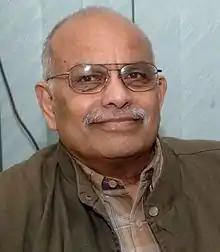Abdul Gaffar Chowdhury
Abdul Gaffar Choudhury (Bengali: আবদুল গাফফার চৌধুরী; born 12 December 1934) is a Bangladeshi-born British writer, journalist, columnist, political analyst and poet. He wrote the lyrics to "Amar Bhaier Rôkte Rangano", a widely celebrated song commemorating the Bengali Language Movement.
Abdul Gaffar Choudhury | |
|---|---|
আবদুল গাফফার চৌধুরী | |
 Choudhury in March 2007 | |
| Born | 12 December 1934 |
| Nationality | Bangladeshi |
| Citizenship | British |
| Alma mater | Dhaka College University of Dhaka |
| Occupation | Writer, journalist, columnist, political analyst, poet |
| Spouse(s) | Selima Afroz Choudhury
(m. 1956; died 2012) |
| Children | 5 |
| Parent(s) | Hazi Wahed Reza Choudhury (father) Zohra Khatun Choudhury(mother) |
| Awards | |
Early life
Choudhury was born in the village of Ulania, Mehendiganj, Barisal, Bengal Province, British Raj.[1] He graduated from Dhaka University in 1959 and came to England on 5 October 1974.[2][3]
Choudhury's father, Hazi Wahed Reza Choudhury, was a landlord and freedom fighter of British India. He was the president of Barisal District Congress and a member of the All India Congress Working Committee. His father was imprisoned in 1942 August Movement. He served as secretary to Motilal Nehru. Zohra Khatun was Choudhury's mother.[2][3]
They are three brothers and five sisters, Ali Reza Choudhury (Mehdi) his younger brother, Hossain reja Choudhury his elder brother. His sisters name is; Manik bibi choudhury, Laili Khatun choudhury, Saleha Khatun choudhury, Masuma Begum choudhury and his younger sister name Fazilatun Nesa Choudhury.
Career
Before moving to the United Kingdom, Choudhury worked as a journalist in different national newspapers in Dhaka. During the 1971 Bangladeshi Liberation War, he worked for Joy Bangla, Jugantar and Anandabazar Patrika.[2][3]
He is perhaps best known for writing the lyrics to Amar Bhaier Rokte Rangano which is recognised as the most influential song of Bengali Language Movement and was initially set to music by him. Later, however, Altaf Mahmud's composed music and adapted the song. It has been regarded by listeners of BBC Bengali Service as the third best song in Bengali.[2][3][4]
In the UK, Choudhury founded the newspaper Notun Din. He has written 35 five books. He lives in London from where he regularly writes columns in national Bangladeshi dailies, in Bengali newspapers of Bangladeshi community and in a daily paper in Kolkata.[2][3]
Some of his notable works are "Dan Pithe Shawkat", "Chandrodwiper Upakhyan", "Nam Na Jana Bhore", "Nil Jamuna", "Shesh Rajanir Chand", "Polashi Thekey Dhanmondi", "Bastobotar Nirikhey" and others.[5][6]
Choudhury has produced a film on the assassination of Sheikh Mujibur Rahman called Polashi theke Dhanmondi.[2][3] It was reported in 2008, that he was due to produce the film The Poet of Politics about the life of Sheikh Mujibur Rahman.[7][8]
Awards
Choudhury has received numerous awards including Bangla Academy Literary Award in 1967, Ekushey Padak, UNESCO literary Award, Bangabandhu Award, Shanghati Lifetime Achievement Award in 2008, Sadhinota Padak in 2009. In the same year, The Daily Ittefaq honoured him with Manik Miah Padak.[2][3][5][6] In 2014, he was awarded the PIB-Sohel Samad Memorial Award.[9][10]
He is a freeman of the London Borough of Tower Hamlets.
Personal life
Choudhury came to the United Kingdom for the treatment of his wife and could not return to Bangladesh for 22 years after the assassination of Sheikh Mujibur Rahman.[2][3] On 18 December 2012, Choudhury's wife Selima Choudhury died in London. They had one son and four daughters.[11] Their son, Anupam, works for Reuters, and their four daughters are Tanima, Chinmoyee, Binita and Indira.[2][3]
Works
| Year | Title |
|---|---|
| 1958 | Dan Pithe Shawkat (Sawkat, The Daring Kid) |
| 1960 | Chandrodwiper Upakhyan (The Tale of Chandradwip) |
| 1962 | Nam Na Jana Bhore (The Nameless Dawn) |
| 1964 | Nil Jamuna (The Blue Jamuna) |
| 1967 | Shesh Ratrir Chand (The Late Night Moon) |
See also
- British Bangladeshi
- List of British Bangladeshis
References
- "Abdul Gaffar Choudhury- An Expatriate Bangladeshi Writer". Sahos. Bangladesh. 12 December 2012. Retrieved 1 June 2015.
- Karim, Mohammed Abdul; Karim, Shahadoth (October 2010). British Bangladeshi Who's Who (PDF). British Bangla Media Group. p. 36. Retrieved 4 May 2015.
- Karim, Mohammed Abdul; Karim, Shahadoth (October 2011). British Bangladeshi Who's Who (PDF). British Bangla Media Group. p. 36. Retrieved 4 May 2015.
- Mallick, Sadya Afreen (21 March 2014). "Spirit of Ekushey". The Daily Star. Dhaka. Retrieved 19 December 2012.
- "Birthday Celebrations for Abdul Gaffar Chowdhury today at Bangla Academy". The Daily Observer. Dhaka. 12 December 2014. Retrieved 1 June 2015.
- Mukul, Manzurul Alam (12 December 2014). "Gaffar Chowdhury's birthday today". RisingBD.com. Dhaka. Retrieved 1 June 2015.
- "Amitabh Bachchan to play Bangladesh founder". Hindustan Times. India. 3 May 2008. Archived from the original on 26 March 2014. Retrieved 19 December 2012.
- "Big B to play Bangladesh's founder Sheikh Mujib in new movie". The Economic Times. India. 2 May 2008. Retrieved 1 July 2015.
- "Language Movement hero Gaffar Chowdhury gets PIB award". Bangladesh Sangbad Sangstha. 23 October 2014. Archived from the original on 10 January 2018. Retrieved 7 July 2017.
- "Abdul Gaffar Chowdhury gets Samad Memorial Award". Dhaka Tribune. 15 December 2014. Retrieved 1 June 2015.
- Pasha, Syed Nahar (19 December 2012). "Abdul Gaffar's wife Selima dies". Bdnews24.com. Dhaka. Retrieved 19 December 2012.
External links
- Abdul Gaffar Choudhury on Facebook
- Protests for the Mother Tongue. BBC World Service. 21 February 2014